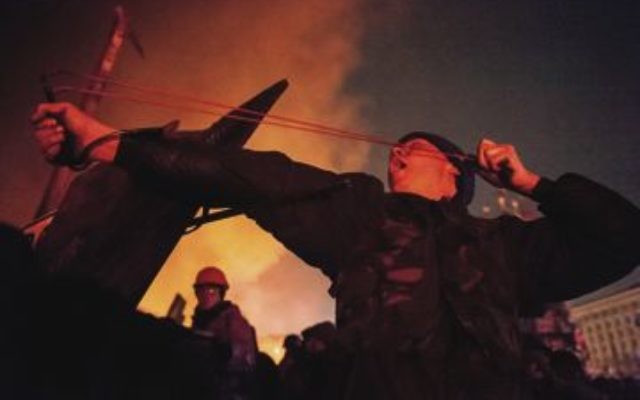Ukraine’s Jews count cost of unrest
The turmoil in Ukraine has left one of Europe’s largest Jewish communities on edge. After an outbreak of violence in Kiev last week that left dozens of protesters and policemen dead, President Viktor Yanukovych fled the capital and Parliament installed an interim leader to take the still-contested reins of power.
Like their compatriots, Ukraine’s Jews are waiting to see what the future holds for their country, but with the added fear that they could become targets amid the chaos.
There have been a few isolated anti-Semitic incidents over the past few months of civil strife. On Sunday night in the eastern city of Zaporizhia, a synagogue was firebombed with Molotov cocktails, causing minor damage.
While Kiev has been relatively calm since Yanukovych fled the capital, the situation in the country’s eastern and southern regions, where he has his base of support, is more volatile. Tensions between the local governments and revolutionaries continue to rise in the eastern city of Kharkiv, which has a relatively sizeable Jewish community.
“It’s still a very fluid situation,” said Mark Levin, chairman of the NCSJ, an American organisation that advocates for Jews in the former Soviet Union. “The big concern, I think, is ensuring that there’s adequate security for Jewish institutions throughout the country, but particularly in the large cities. And I think that’s where much of the focus within the American Jewish community and Israel lies – that and making sure the flow of services continues.”
Levin also expressed concern that with elections slated for May 25, a future government could result in ultranationalists gaining power in Ukraine. Svoboda, a right-wing nationalist party, was prominent in the protest movement, and party officials have expressed virulently anti-Semitic sentiments.
Thus far, though, the conflict has not been marked by incitement against Ukraine’s multiple national minorities.
“The overall situation in relation to the Jewish community in Ukraine is tolerant and peaceful,” said Vadim Rabinovich, president of the All-Ukrainian Jewish Congress. “There have been no mass outbursts or exacerbation of anti-Semitism in Ukraine.”
Estimates of the size of Ukraine’s Jewish community vary widely. Some commonly cited statistics suggest the country has only 70,000 Jews, while the European Jewish Congress and the JDC say there are as many as 400,000.
Over the past few months, many Jewish institutions have simply gone into hibernation, suspending activity during the turmoil. But others have carried on their work under heavy security.
The Jewish Confederation of Ukraine, which runs the Orach Chaim day school in Kiev and several other institutions, has been paying $1000 a day for round-the-clock security by teams from two private firms, one of which also provides security for the Israeli embassy in Kiev. Together, staff guard nine buildings, including four school buildings, a community centre, a synagogue and a religious seminary, according to Rabbi Yaakov Dov Bleich, the confederation’s president and a Ukrainian chief rabbi.
“Nobody goes alone at night, so we have three people doing escorts from the synagogue and back,” he told JTA.
The Joint Distribution Committee (JDC) also has promoted security measures to protect staff and volunteers. After the firebombing of the Zaporizhia synagogue, JDC reinforced security measures for its charity organisation in the city.
The JDC has been continuing to provide assistance to elderly and homebound Jews living in areas of Ukraine that have been affected by the unrest.
With Yanukovych ousted and avoiding the acting government’s warrant for his arrest for alleged murder, many hope the situation will stabilise. But if it doesn’t, Bleich’s community may not be able to keep its institutions running for another month.
“We already paid the bill for January, and now we have to pay the bill for February, and it’s a big one,” Bleich told JTA on Friday.
Bleich was asked in a radio interview on Sunday night about concerns over anti-Semitism within the ranks of the protesters.
“The majority of the protesters are grassroots, regular, everyday old people from Ukraine that were fed up with living in a corrupt society.” he said. “That’s the majority. They’re not anti-Semites, they’re not right-wing, nationalist, neo-fascists or Nazis.”
But Bleich cautioned that there is a minority element within the opposition that is anti-Semitic, citing Svoboda. “The Jewish community has to stay vigilant and see what’s going to be,” he said. “What’s going to happen with this new government? Are they going to be a part of the government?”
TALIA LAVIN & CNAAN LIPSHIZ
JTA


comments